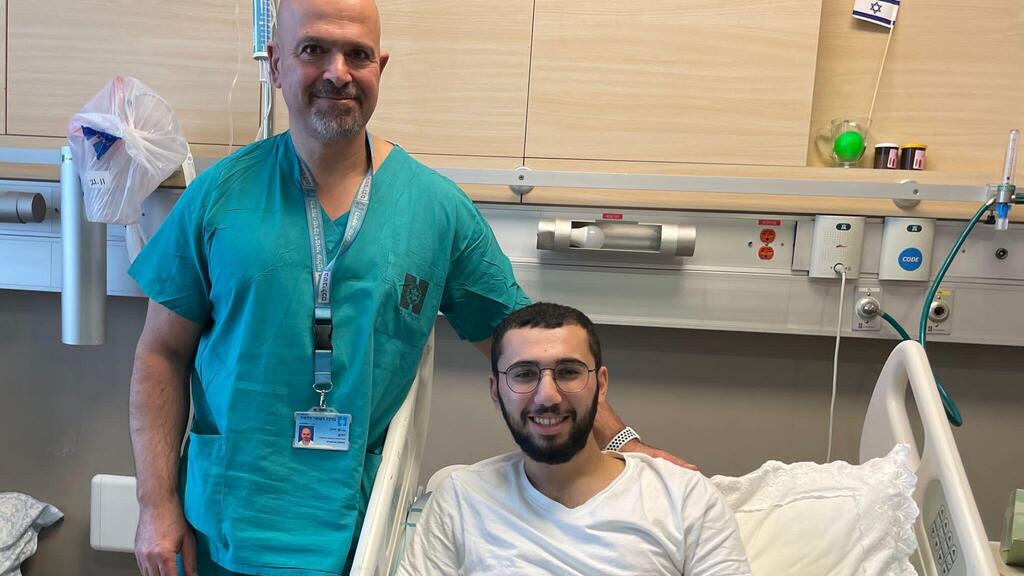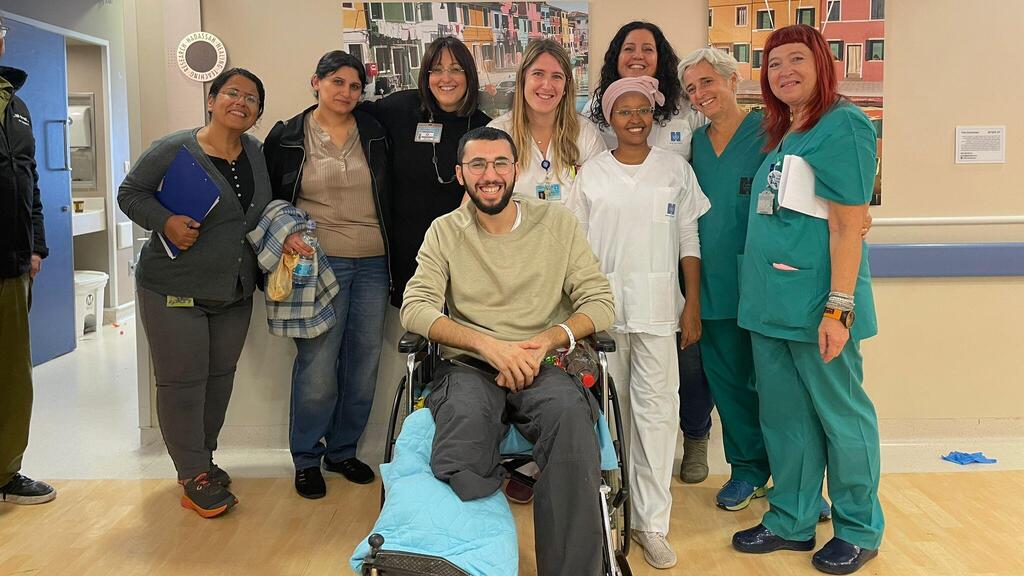Getting your Trinity Audio player ready...
The odds were slim, and the life of Roni, a soldier in the Nahal Brigade, was in jeopardy, but the medical team did not give up. Roni, who was severely wounded by gunfire on October 7, and had a tourniquet placed on his leg, was airlifted in critical condition to the Hadassah Medical Center where doctors managed to save his life through a series of complicated surgeries.
Read more:
In the early morning hours of that Saturday, Roni set out for a patrol from his stationed base. While he and his team were in the field, a prolonged barrage of mortar shells began heading toward Israeli territory.
"The gunfire was incessant," he describes. "We decided to drive quickly to the base while rockets were falling next to us along the entire route. The vehicle I was driving was shaking."
During the journey, the three soldiers noticed a large number of terrorists penetrating the border fence. "That's when we realized we were in a war," he recounts. As they drove under relentless fire, they reached the base and saw terrorists crowning the perimeter, aiming to infiltrate.
"The terrorists were standing with cars and motorcycles in front of us. They outnumbered us, so we decided to turn around, take cover, and fight them from there." While searching for a better position, they spotted an RPG missile heading towards them from the enemy area. The missile hit their vehicle, but they managed to get out of it and continue fighting.
"After the impact from the explosion, the three of us managed to exit the vehicle to engage the terrorists. After a short time, the two soldiers who were with me, First Sergeant Roei Chapel and Staff Sergeant Tomer Mizrahi, were injured and killed. I was left alone in the field facing dozens of terrorists."
While fighting alone, Roni was hit in his right leg by a bullet and sought cover, trying to assess the severity of his injury. "I took a bullet in the leg, tried to keep walking on it, and couldn't," he recalls. "I hopped on one leg until I reached the bushes and hid there. I applied a tourniquet to myself until the bleeding stopped." During the firefight, a group of soldiers swooped him into a vehicle, and a military medic treated him while the others continued the battle.
The soldier who set an example to what is determination
After eight hours of waiting with a tourniquet on his leg, Roni was evacuated by helicopter to Hadassah Medical Center. Professor Meir Liebergall, head of the Orthopedic and Skeletal Department, who immediately operated on Roni upon his arrival, describes the situation: "Roni arrived at the hospital with a severe multi-system injury, with the significant injury being in his right leg. When we removed the tourniquet, the muscle was in poor condition, releasing many toxic substances into the body. He was in a life-threatening situation, and we decided to fight for his life and his leg."
Over the next week, doctors tried to remove dead muscles and preserve what they could of Roni's leg. However, Roni began to develop an infection that threatened his life. "We faced a very difficult decision. We understood that there was no choice, and we had to amputate his leg to save his life," explains Professor Yoram Weil, director of the Orthopedic Trauma Unit at Hadassah, who performed the surgery at this stage. "It was important for us to insist and perform the amputation below the knee to minimize his functional limitations in the future, and on the other hand, the life of this young man was at stake. We couldn't give up."
Roni underwent 12 surgeries performed by orthopedic and plastic surgery teams, during which the medical team managed to overcome the infectious condition and preserve the functionality of his knee, which will aid in his ongoing adaptation to the new situation. After the surgeries, he was transferred to the Orthopedic Department, where he received treatment until the beginning of the rehabilitation process.
Professor Weil stated, "Roni fought a battle, and we fought for his life. He still has a long way to go in the rehabilitation process, and I wish him great success. I've already had the privilege of getting to know a soldier who doesn't give up and has taught us all about determination, and I'm confident that he will continue in the same spirit."
After approximately two months of treatment by the medical team at Hadassah, Roni bid an emotional farewell, saying, "My life was saved. I got my life back, and I want to express heartfelt thanks to Hadassah Medical Center and all the staff—the nursing, medical, and social work teams—for their dedicated care. I was hospitalized here for a long period, and I always felt that I was in good hands, receiving professional and compassionate care. When facing such a challenging situation, that's what makes a difference."




